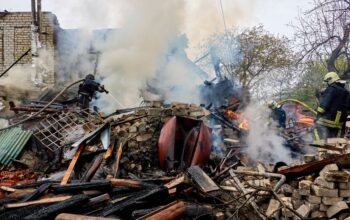
BOGOTÁ — Secretary of State Antony J. Blinken met on Monday with Colombia’s newly elected president, Gustavo Petro, a leftist leader whose positions on Cuba, the drug war and Venezuela’s anti-American leadership all break from those of the Biden administration, testing the two countries’ longtime close relationship.
Mr. Blinken arrived in Bogotá at the start of a five-day trip through South America, where he will meet with a trio of leaders elected in recent months on left-wing populist platforms. The trip comes a day after Brazil’s right-wing president, Jair Bolsonaro, placed second behind his leftist challenger, Luiz Inácio Lula da Silva, in a first-round presidential vote that sets up a runoff election on Oct. 30.
The United States has historically close ties with Colombia, having supported its long military campaign against drug cartels and, more recently, having cooperated with Mr. Petro’s right-wing predecessor, Iván Duque, to isolate the populist Venezuelan strongman Nicolás Maduro.
But the June election of Mr. Petro to succeed Mr. Duque is placing stress on that relationship.
In a joint news conference with Mr. Petro at Bogotá’s grand presidential palace, Mr. Blinken downplayed any differences. “We’ve been listening to each other, and we’re learning from one another,” he said.
Mr. Petro, a former member of an urban guerrilla group and a passionate environmentalist, has said that “the war on drugs has failed” in his country, which is the world’s top cocaine producer. He has proposed ending the forced eradication of coca and backs legislation that could decriminalize and regulate cocaine sales.
Mr. Petro has said that America’s drug problem is now overwhelmingly dominated by synthetic drugs like methamphetamine, not cocaine from Colombia, and that more Colombians die from drug violence than Americans do of cocaine overdoses. But the Biden administration publicly opposes his approach.
Standing alongside Mr. Blinken, Mr. Petro acknowledged at the joint news conference that “we view the war on drugs differently.”
Venezuela is another point of friction. While having branded Mr. Maduro a “dictator,” Mr. Petro has moved quickly to restore his country’s ties with neighboring Venezuela, saying the two populations should coexist in harmony.
President Biden has left in place the punishing sanctions imposed against the Maduro government by the Trump administration. Like President Donald J. Trump, Mr. Biden has not recognized Mr. Maduro as the country’s leader and has no formal diplomatic relations with Caracas, although on Saturday the United States conducted a prisoner exchange with Mr. Maduro’s government that freed several long-held Americans from the country.
Mr. Blinken thanked Colombia for hosting vast numbers of Venezuelan migrants, 1.7 million of whom Colombia granted temporary legal status last year.
Mr. Blinken said that the United States continued to support a dialogue between Mr. Maduro’s government and the opposition leader Juan Guaidó, whom the United States has recognized as the country’s legitimate leader.
“That is fundamentally what is necessary for Venezuelans to not feel the obligation to leave the country that is theirs, as well as for Venezuelans to return,” Mr. Blinken said, referring to the need for dialogue.
Differences also emerged between Mr. Blinken and his host on the subject of Cuba. Asked whether the Biden administration might reverse a Trump administration designation of Cuba as an official state sponsor of terrorism, Mr. Blinken was noncommittal, citing a formal process for reversing such designations.
Mr. Petro declared the designation “an injustice,” saying that it punished Cuba for hosting — with what he called the approval of a previous Colombian government and the Obama administration — peace talks with former rebels whom the Trump administration branded terrorists.
Mr. Petro said the designation “needs to be corrected.”
The Biden administration is working with Mr. Petro to ensure the continued implementation of a 2016 peace agreement that ended decades of fighting between Colombia’s government and guerrillas from the Revolutionary Armed Forces of Colombia, or FARC.
After his meeting with Mr. Petro, Mr. Blinken visited the Fragmentos Museum, dedicated to the memory of the country’s bloody conflict, whose floors are paved with melted-down weapons turned in by rebel fighters after the peace agreement.
Mr. Blinken will also visit two more countries that both elected leftist presidents within the past 18 months: Peru and Chile.
While polls had suggested that Brazil would also elect a leftist, Mr. da Silva, in the first round, Mr. Bolsonaro was able to force a runoff vote.
Biden administration officials have declined to weigh in on Brazil’s presidential candidates despite their private distaste for Mr. Bolsonaro, not least because they see his baseless talk of election fraud as undermining democracy in the region.
On Sunday night, Mr. Blinken tweeted congratulations to Brazil for its “successful” first-round election. “We share Brazil’s confidence that the second round will be conducted in the same spirit of peace and civic duty,” he added.
Whatever differences Mr. Petro may have with Mr. Blinken, he appeared to hold his visitor in great respect.
“I think you will eventually be U.S. president,” he said to the diplomat, who is not known to have expressed interest in running for office. Mr. Blinken flashed a smile of surprise and shook his head.

